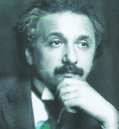Letter of Condolence
 From the desk of Fr. Ignatius Waters CP
From the desk of Fr. Ignatius Waters CP
Sunday 24th April 2016
On 7th Jan. 1939, Einstein wrote a beautiful letter of condolence to his son and daughter-in-law, Hans Albert and Frieda Einstein. By 1939, Einstein had reached an age when, as he liked to say, the devil didn’t give one much time off. His losses, at sixty-five, were mounting: his wife dead, a step-daughter too, a son lost to madness, his own life uprooted and now lived in exile. His relentless battle to single-handedly save as many Jews as he could from Hitler, was lost as well. With the advent of war, it was impossible for Jews to emigrate from Germany. How, without belief in a personal God, he dealt with “all the difficulties and bitterness that the past years have brought” is the subject of this painful, realistic, and ultimately optimistic letter. It concerns a “blow that has hit terribly hard” – the death of his six-year old grandson:
“Dear Children, at such a young age you have been struck by the worst thing that loving parents can experience. This little boy had the promise of becoming a real man with a balanced and healthy outlook on life. Something joyful and sunny emanated from him. Although I saw him for such a brief time, he was just as close to me as if he had grown up under my eyes. Thus, this blow has hit me terribly hard, coming after all the difficulties and bitterness the past years have brought.
But I believe we belong to those, who grow stronger and more selfless with every trial of fate. To remain benevolent towards one’s fellow man when one has forgotten how to expect much from life for oneself – this is what one should strive towards. Your short letter, dear Albert, has shown me again that you are somebody who can stand up to life in the best possible way. This knowledge comforts me a lot. Both of you will surrender to fate only through death. I press your hands warmly. Papa.”
Towards the end of his life Einstein wrote: “I am not an atheist. You may call me an agnostic. I prefer an attitude of humility corresponding to the weakness of our intellectual understanding of nature and of our own being.”
Even blessed with faith in a personal God, we would find it difficult to write as encouraging a letter as this!


